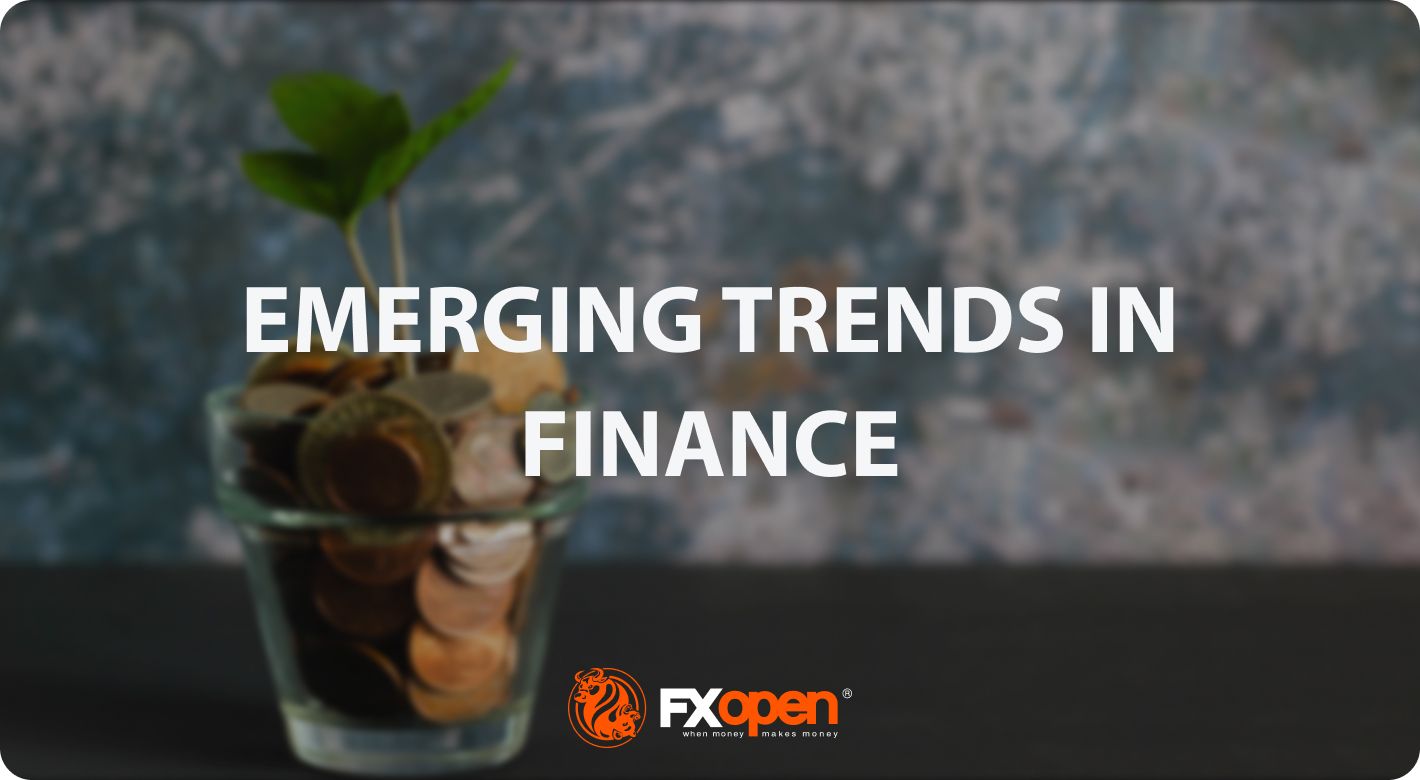FXOpen

In 2023, the FinTech industry is in for a change. The latest trends in finance reflect developments in the way financial institutions operate and interact with consumers. Financial industry leaders are prioritising strategic initiatives focused on digital transformation, security, and the adoption of new tools. In this FXOpen article, we will look into the top six emerging trends in finance.
The Finance Industry Adopts Blockchain Even More Actively than Before
Blockchain technology adoption is not a new trend in finance, but more and more companies and institutions are utilising it. It is no longer associated exclusively with crypto*. Experts predict that it will be increasingly integrated into existing financial systems, allowing banks to conduct cheaper and more efficient transactions while maintaining a high degree of security.
The financial industry recognises the transformational impact of blockchain. Many companies, including HSBC, Wells Fargo, PayPal, Mastercard, and JP Morgan, already use blockchain technology to settle forex transactions and allow users to make payments using bank-backed cryptocurrencies*.
A Growth in Demand for Financial Apps
As young people become more financially empowered, they are increasingly demanding more engaging digital experiences. Financial apps must match the convenience and ease of use that consumers are accustomed to seeing in everyday life, for example, in online shopping. In parallel, the number of people using apps for investing is growing.
Additionally, clients value engagement, rich media video content, and interactive tools. Interactive content sees 52.6% more engagement than static content, as reported by Mediafly. To meet this and other customer experience expectations, organisations prioritise offering mobile-friendly solutions and self-service digital options that are available anytime, anywhere.
Since our modern trading platform strives to satisfy our customers, we offer convenient and easy-to-use tools that help traders simplify their tasks and analysis. Explore TickTrader and discover limitless trading opportunities in various markets with just one login.
Increased Use of Artificial Intelligence and Machine Learning
The role of artificial intelligence (AI) is increasing, as it is expected to help banks improve financial performance and increase data transparency. For example, according to a survey by the Bank of England and the Financial Conduct Authority published in October 2022, 72% of financial firms use or are developing ML applications.
According to another piece of research, 41% of financial organisation executives believe that AI chatbots will be the primary point of contact for customer service by 2025.
Financial institutions are expected to continue building enterprise AI infrastructure, including hardware, software, and services, to expand and scale AI. This has a huge potential to increase financial organisations’ revenue by automating repetitive tasks, reducing errors, improving user experience, and increasing customer loyalty.
More People Install Finance Management Apps
Since the pandemic changed the way we think about fast contactless online money transfers, apps for payments, investments, lending, and monitoring finances have become more popular. People are attracted not only by the ability to manage their money remotely but also by the speed and ease of making payments in a couple of clicks.
Moreover, access to statistics on spending, savings, and transfers for a given period allows users to track and control their finances. Gradually, with the adoption of the open banking concept, financial apps will become even more secure and gain more audience.
Fintech Uses More Cloud Platform Services
A couple of years ago, in 2020, HSBC signed a long-term agreement with Amazon Web Services to migrate existing functions to new cloud technologies. And Deutsche Bank, partnering with Google, has created a cloud-native environment for applications.
Today there’s a clear trend that cloud systems are replacing outdated alternatives. In 2022, IT giants were increasing their use of cloud-based services (41.4%), planning to migrate from legacy enterprise software to cloud-based instruments (33.4%), and moving on-premises workloads to the cloud (32.8%). The financial industry is on the list of sectors that cloud service providers are targeting.
According to IBM, cloud systems allow for greater flexibility, lower IT costs, and lower operating expenses. With the power of the cloud, financial organisations can consistently maintain high productivity and increase customer and employee satisfaction.
Companies need to move to the cloud to leverage the practical capabilities of artificial intelligence, ensure compliance and risk management, and optimise remote working. Cloud-based systems support the integration of apps and business processes to reduce repetitive manual tasks.
Finance Industry Focuses on Security
In recent years, cybersecurity and fraud risks have increased. Companies complain that digital fraud is hindering innovation and stopping their expansion into new channels. Financial data and customer personally identifiable information are very valuable to hackers, and a security breach can result in the loss of customers and bank revenue.
As a trading platform, FXOpen makes security a key priority. We are optimising our internal processes and are selective in collaborating with third parties. So, if you decide to open an FXOpen account, you can be sure that it is safe and that your data is encrypted.
*At FXOpen UK and FXOpen AU, Cryptocurrency CFDs are only available for trading by those clients categorised as Professional clients under FCA Rules and Professional clients under ASIC Rules, respectively. They are not available for trading by Retail clients.
This article represents the opinion of the Companies operating under the FXOpen brand only. It is not to be construed as an offer, solicitation, or recommendation with respect to products and services provided by the Companies operating under the FXOpen brand, nor is it to be considered financial advice.
Stay ahead of the market!
Subscribe now to our mailing list and receive the latest market news and insights delivered directly to your inbox.








